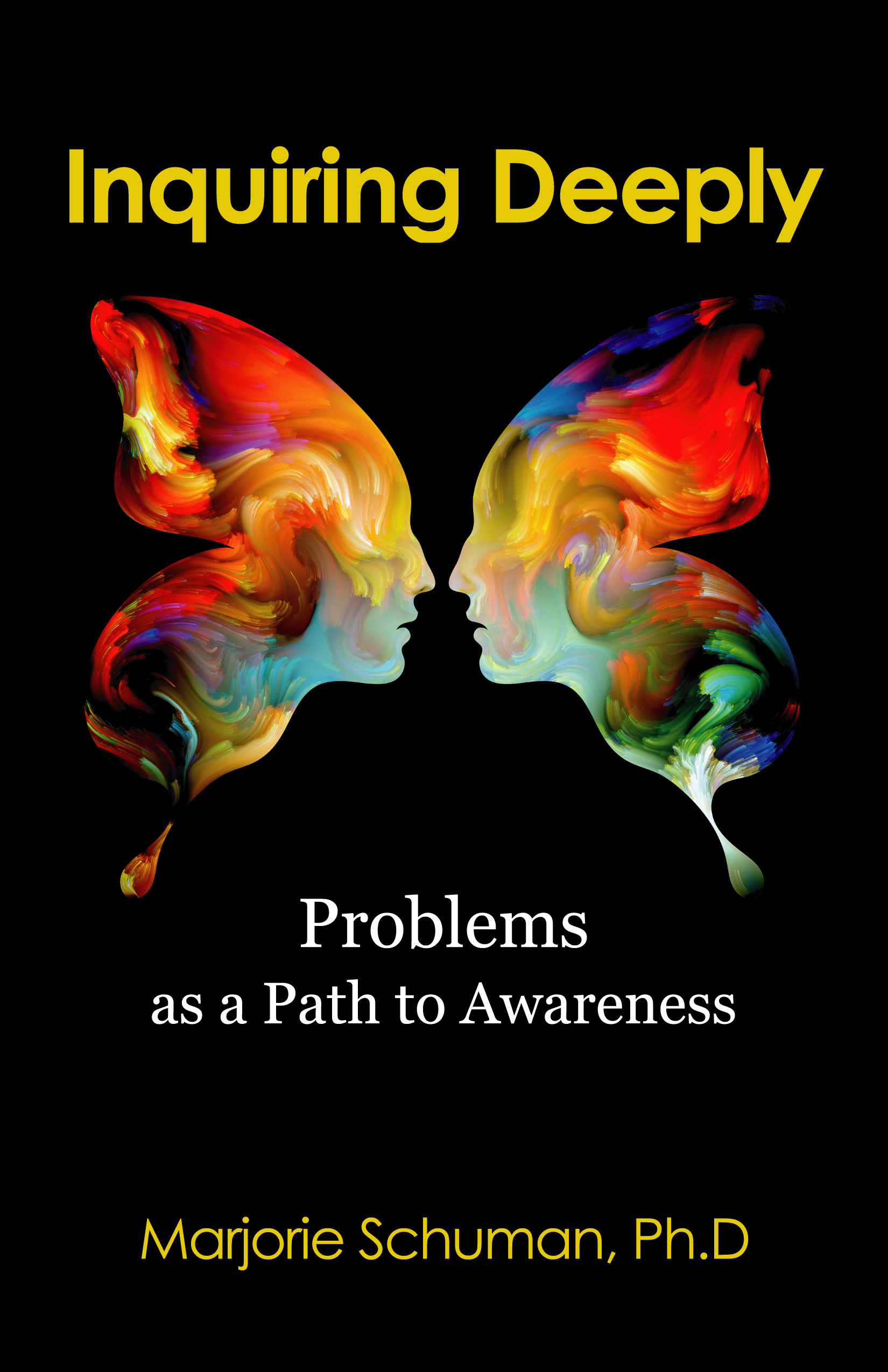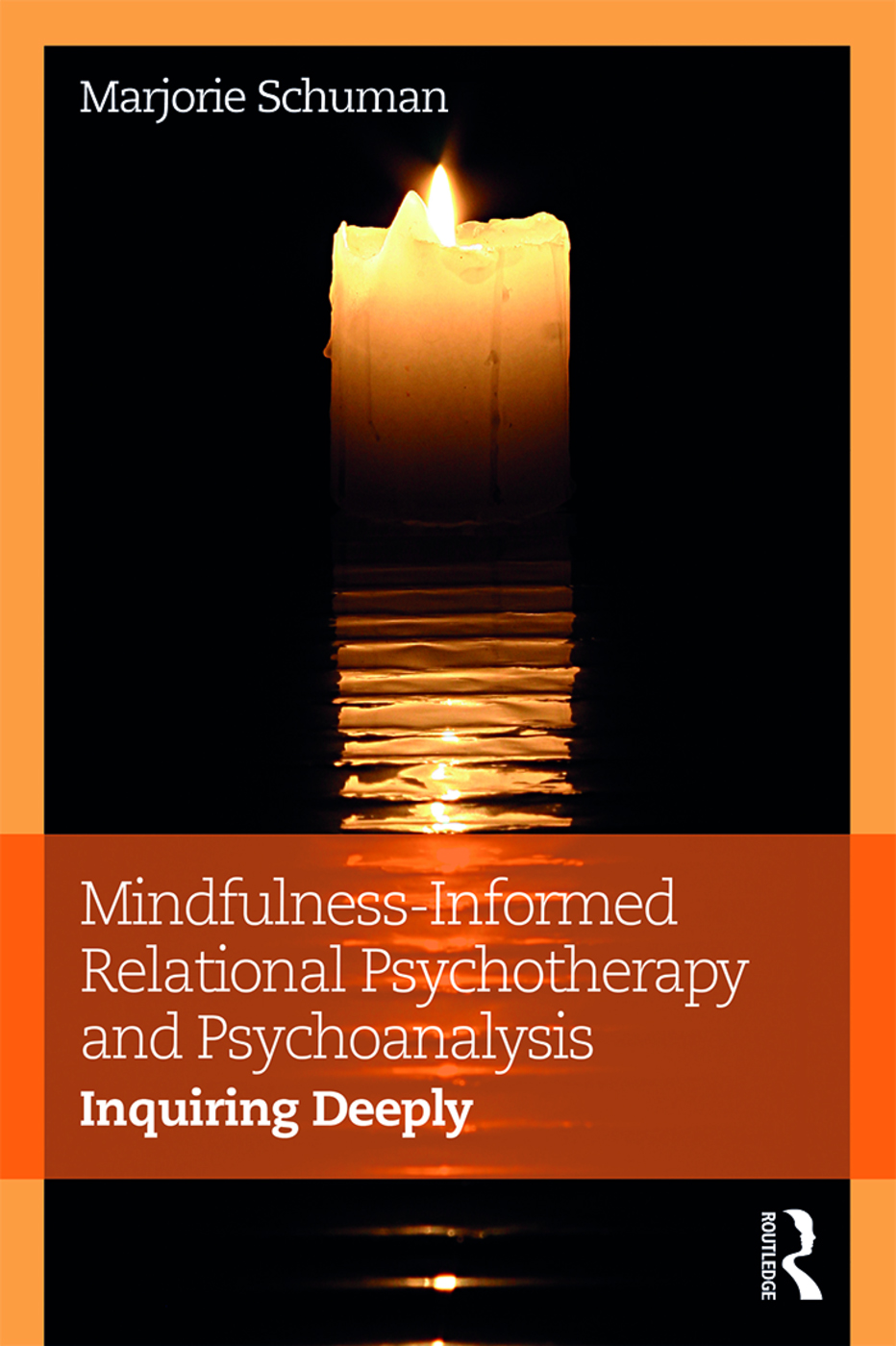Publications


Inquiring Deeply: Problems as a path to Awareness
(Inquiring Deely Press, 2023)
Problems are the leading edge or horizon of change in our lives. They have a role in our minds analogous to the role of pain in the body: they call our attention to what we most need to see. Like an extended conversation that takes place both within ourselves and in the external world simultaneously, inquiring deeply about problems shows us where we have shut down, where we need to wake up, and where we need to grow.
Weaving together the insights of psychoanalysis with the wisdom of Buddhist psychology, in this book of essays Marjorie Schuman illuminates some of our common human predicaments and articulates what can be learned when we use self-reflection and deep meditative inquiry to unpack psychological issues and problems.
Through the process of asking questions and listening deeply for answers, Inquiring Deeply consciously engages our experience of problems in an ongoing way which invites the wisdom within them to unfold.

Mindfulness-Informed Relational Psychotherapy and Psychoanalysis: Inquiring Deeply
(Routledge Press, 2017)
Blending the knowledge of contemporary psychoanalysis with the wisdom of Buddhist view, Mindfulness-Informed Relational Psychotherapy and Psychoanalysis: Inquiring Deeply
explores how mindfulness can be integrated into psychodynamic treatment as an aspect of self-reflection rather than as a cognitive behavioral technique or intervention. It shows how meditative inquiry can be used strategically to amplify and unpack psychological experience.
Written for Buddhist-minded psychotherapists and psychologically-minded Buddhist practitioners alike, Marjorie Schuman’s insightful book shows how problems can be approached in relational psychotherapy in a way that is congruent with Buddhist psychology and practice. This cogent framework illuminates how the experience of Self and Other is involved in emotional pain and relational suffering.
In this thoughtful and insightful book, Marjorie Schuman presents a penetrating analysis of conceptual issues, illustrated throughout with clinical material. The set of reflections in Mindfulness-Informed Relational Psychotherapy and Psychoanalysis comprises an unfolding deep inquiry in its own right, delving into the similarities and differences between mindfulness-informed psychotherapy, on the one hand, and mindfulness as a meditation practice on the other.
Schuman, M. (2019)
Inquiring Deeply About Equanimity, Wise Brain Bulletin, 3(5): 16-25
Equanimity may be defined as the ability to maintain mental and emotional stability in the midst of challenges from all manner of circumstances, misfortunes, losses, and traumas. The most basic question(s) to be considered are what disrupts us emotionally, and why.
Schuman, M. (2018)
Mindfulness and Psychotherapy: Deepening The Conversation.Wise Brain Bulletin 12(1), 2018
Both psychotherapy and Buddhist mindfulness meditation have the purpose of helping us to get to know our own minds. The shared core of these two modalities of introspection is the ability to notice and be with what is; to be intimate with experience.
Schuman, M. (2018)
Speaking and Listening: The Intimate Dance of Communication. Wise Brain Bulletin, 12(5), 2018
Conversation is an essential element in the dance of human existence. In fact, since we do spend a large part of our lives talking to people, bringing attention to what takes place during communication…
Schuman, M. (2018
Mindfulness Meets Psychoanalysis: Inquiring Deeply About “SELF”
The experience of being a “self”, being “someone”, is a given in ordinary experience. We all have some sense of “who we are”, some sense of coherent identity in the core of our being.
Schuman, M. (2017)
Inquiring Deeply: How to Use Intuitive Inquiry To Deal With and Help Solve Problems The Mindful Word, October 2017
Everyone has problems: situations or circumstances that are unwelcome and cause perplexity or distress. This universality suggests that problems must, in some way, be intrinsic to the very nature of our minds. Indeed, the mind seems…
Schuman, M. (2006)
Driven To Distraction:[1] Observations on Obsessionality. in Cooper, P. (ed) Into the Mountain Stream: Psychoanalysis and Buddhist Experience. Rowman & Littlefield, Maryland
This paper explores the nature of “obsessional mind” from Buddhist and psychoanalytic points of view. It takes up basic questions about the inherent qualities of restlessness or lack of attentional focus in the mind and compares these experiences with the clinical features of Obsessive Compulsive Disorder.
“Driven To Distraction” discusses obsessionality both from the perspective of indwelling patterns of arousal in the brain/mind as well as with respect to personality traits and psychodynamic factors.
An integrative explanatory perspective is developed which draws upon the psychoanalytic concept of the “mind-object”. In its conclusion, the discussion centers on the usefulness of mindfulness meditation in the mitigation of obsessionality.
Download Full Publication (Click Here)
[1] The title of this chapter was created without knowledge of the existence of a book by the same title, on the subject of Attention Deficit Disorder, written by Edward Hallowell.
Schuman, M. (1998)
Suffering and the Evolution of Subjectivity. paper presented at conference on Psychotherapy, Spirituality, and the Evolution of Mind. Santa Monica, CA.
The human mind is impressive in its evolutionary progression of consciousness and intelligence. We see the emergence of imagination and creativity and the development of remarkable abilities to understand, mimic, and manipulate natural processes…
Schuman, M. (1991)
The problem of self in psychoanalysis: Lessons from Eastern Philosophy. Psychoanalysis and Contemporary Thought, 14(4): 595-624.
In the Eastern philosophical paradigm, as in psychoanalytic theory, there are two distinct frameworks for the concept of self.
Schuman, M. (1980)
The psychophysiological model of meditation and altered states of consciousness. in Davidson, J.M. and Davidson, R. J. (eds) The Psychobiology of Consciousness. Plenum Press, New York.
In recent years, a growing literature has addressed itself to the psychophysiological bases of altered states of consciousness (ASCs). An unpredented interest in mediation, biofeedback, and other techniques for altering …